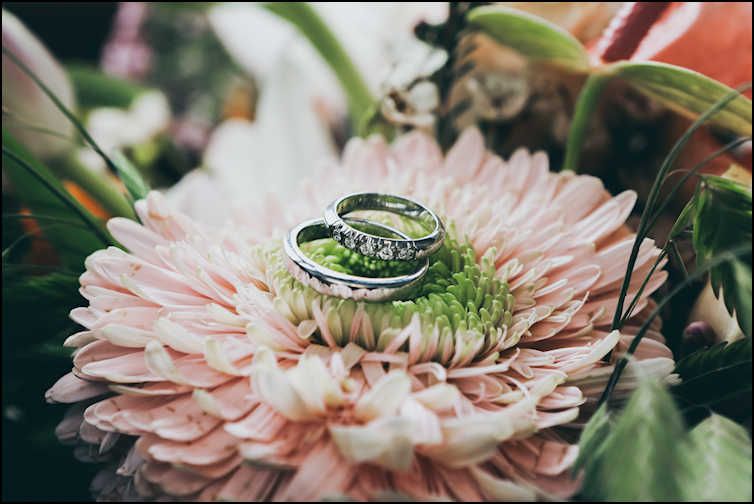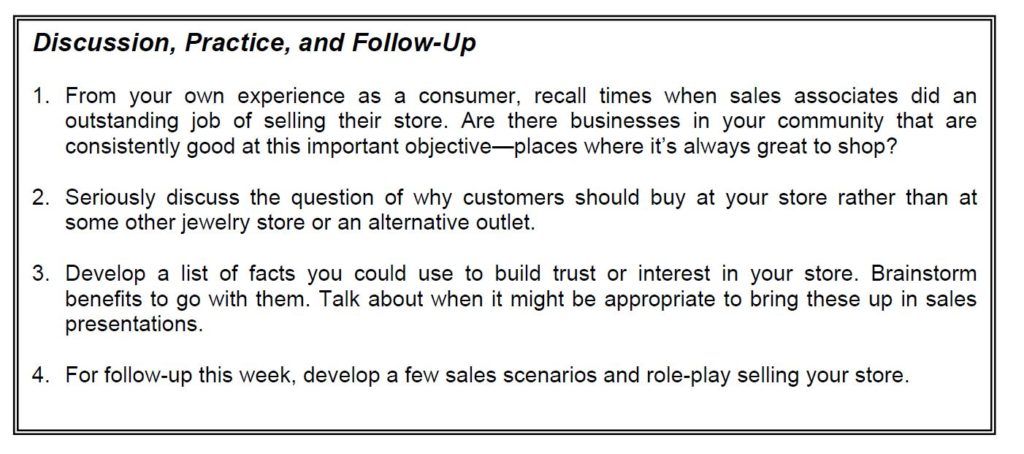Selling Your Store
Article provided for The Plumb Club by Kate Peterson, PC Performance Concepts

When a customer walks in your door, he’s interested in jewelry, but that’s almost certainly not all.
Just as importantly, he’s looking for a place to buy jewelry—in other words, a company he likes and a professional team he trusts, a store where he wants to do business. Without too much effort, he can probably find several other retailers selling similar merchandise at comparable prices. So, you need to ask yourself, “Why should he spend his money here?” Then, ensure the customer receives a convincing answer, even if he never comes out and asks the question directly.
Like most messages you seek to send customers, this one has nonverbal components, and everything in and around your store should contribute. From the look of your décor and displays to your and your team’s knowledge and sincere concern, each element of your store’s entire operation can help create a welcoming environment and an enjoyable and trusting experience.
It’s also critical to articulate—or put into words—your “Why Buy Here” message. This begins with identifying information that can build trust or interest in your store:
- Longevity—To many customers, the number of years you’ve been in business more or less correlates with reliability and other positive attributes. If your store is at least 10 years old, longevity is a point you can emphasize.
- Personality—The people who are (or have been) part of a business can become part of its appeal. Well-known examples in our industry include Louis Cartier, Charles Tiffany, and Harry Winston. Stories about these individuals add lively color to the companies that bear their names. That could also be true for your store— especially if you and your team are actively involved in the community.
- Tradition—The fact that you’re a second or third-generation jeweler conveys a sense of heritage and continuity that’s hard to find and highly valued in today’s fast-changing retail landscape.
- Combined Experience—If you add up all the years everyone on your team has worked in the jewelry trade, you might have a surprisingly large and impressive number. Much like the store’s longevity, this correlates with expertise and reliability.
- Affiliations and Credentials—Most industry organizations set high ethical standards for members, and training from recognized institutions demonstrates a commitment to excellence. If you display membership seals and diplomas in your store, you should also be prepared to explain what they mean.
- Services, Policies, and Guarantees—Almost all of your services and guarantees can be cited as examples of how your store stands behind its products and protects its customers’ interests.
Like details about the jewelry you present, facts about your store should always be linked to individually significant benefits. To one customer, the fact that you’ve been in business 35 years might mean he can rest assured you’ll be around if an item ever needs to be repaired. For another, it could signify the prestige or confidence of purchasing an engagement ring from the community’s oldest and most respected jeweler.
It’s also important to consider timing, context, and how to obtain maximum impact. Let’s say, for example, that you tell a customer a tanzanite’s color was produced by heat treatment. Then you point out that the treatment is considered routine in the gem trade; most suppliers and retailers don’t even mention it, but your store has a strict policy of full disclosure to ensure complete customer protection and satisfaction. See how much you can accomplish with a statement that takes less than 20 seconds!
The most important thing to recognize is that if you try to sell your store along with every item you show, you’ll offer customers what they want—beautiful jewelry and a great place to buy it. All it takes is working through the familiar process of identifying features, formulating benefits, and finding opportunities to present them to customers.
